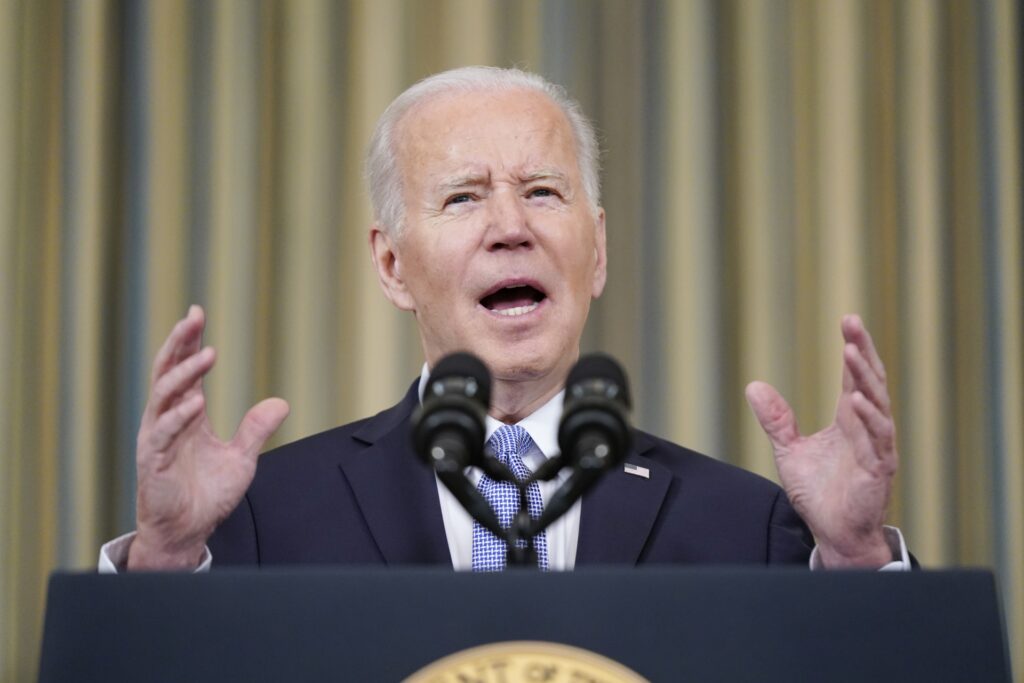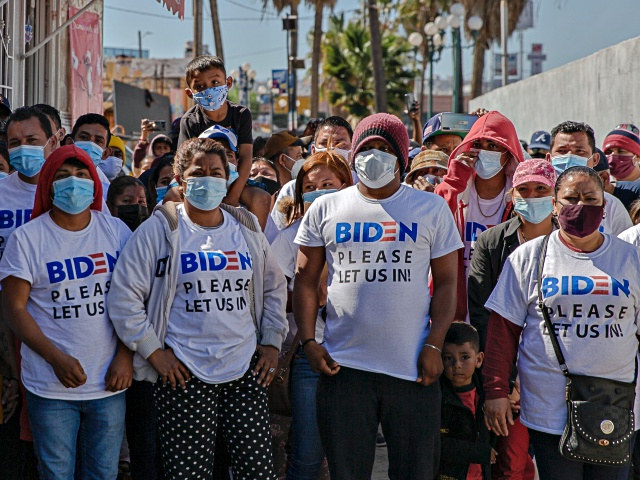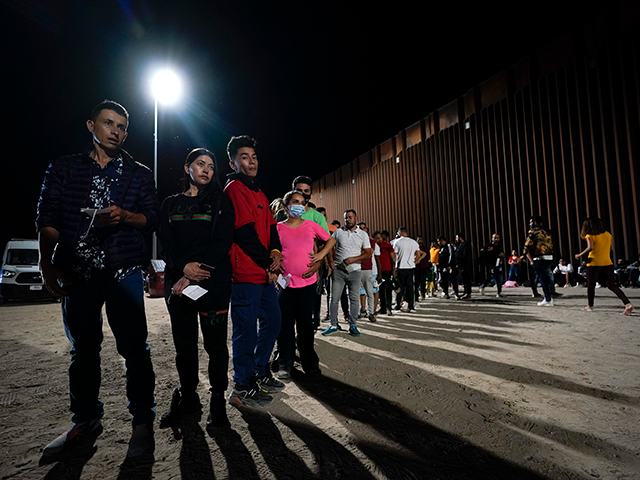President Joe Biden’s wave of economic migrants will cost Americans roughly $20 billion per year, says an estimate by the Federation for American Immigration Reform (FAIR).
“FAIR conservatively estimates that each illegal alien costs American taxpayers $9,232 per year,” said a February 13 statement from the group, amid reports that Biden’s deputies have allowed more than at least 1.3 million economic migrants across the southern border since January 2021.
The cost is “staggering,” said Dan Stein, president of FAIR. The diverted billions “could address some very important needs of the American public,” he said, such as:
Providing every homeless veteran in America $50,000 per year for a decade. This would effectively end veteran homelessness.
Giving every family in America earning $50k or less a grocery voucher of roughly $410.
Hiring more than 315,000 police officers to combat rising crime across the country.
Hiring of 330,000 new teachers, which would easily end the long-standing teacher shortage in America.
Construction of nearly the entire Southern Border Wall (which could prevent millions more illegal aliens from entering).
Before Biden’s inflow, according to FAIR, the resident population of illegal migrants costs the federal government roughly $140 billion on migrants per year.

President Joe Biden speaks in the State Dining Room of the White House on April 1, 2022, in Washington. (AP Photo/Patrick Semansky)
Biden’s deputies recognize that many migrants rely on government aid, and have revised regulations to let them use welfare programs without risking deportation. Moreover, Democrat-run states are offering extra aid — including healthcare, driver’s licenses, and professional licenses — to illegal migrants, even as inflation has cut Americans’ wages during the last year.
All this extra government spending on migrants is a boon for the business sector.

02 March 2021, Mexico, San Ysidro: “Biden, please let us in,” reads in English on the T-shirts of a group of migrants from different backgrounds who made their way to the “El Chaparral” international border crossing. (Stringer/picture alliance via Getty Images)
The extra government spending stimulates the economy as the cash flows from government agencies into the general economy, where it eventually adds to the investor profits gained from migrants’ cheap labor, consumer spending, and high-occupancy rents.
Business-backed pro-migration groups scoff at FAIR’s calculations, mostly by arguing that particular spending should not count, the money will eventually be repaid by taxes on illegals’ income and spending, and that migrants also expand the economy.

Migrants prepare to board a Border Patrol bus on May 20, 2022, in Eagle Pass, Texas. (Brandon Bell/Getty Images)
For example, a 2017 report by the CATO Institute says the cost of illegal immigration could be reduced by cutting spending on border enforcement:
FAIR’s argument here comes down to “The U.S. needs to enforce our immigration laws better because the cost of enforcing immigration laws is so high.” We suggest an easy remedy for this problem — cut immigration enforcement.
CATO also argues that migrants inflate the overall U.S. economy, regardless of the impact on individual American families. For example, illegal migrants sharpen competition for housing, so boosting real-estate taxes to local governments, says CATO:
If the typical illegal immigrant increases the value of all housing unit prices by 11.5 cents, then illegal immigrants increase nationwide housing values by about $1 trillion. Using the 1.15 percent average annual property tax rate, the increase in housing values created by illegal immigrants results in … additional tax revenue.

Brian Terry Station Border Patrol agents arrest a human smuggler and migrants during a traffic stop in Arizona. (U.S. Border Patrol/Tucson Sector)
CATO’s analysis, however, sidelines the marketplace costs imposed by business-backed migration on Americans’ pocketbooks. Those costs include lower wages, higher housing costs, more civic chaos, and reduced corporate investment in Americans’ productivity.
But voters feel those costs that are imposed by businesses’ support for migration.
The Texas Tribune reported on September 12 from Maverick County in southern Texas:
Ana Gabriela Derbez, a candidate for justice of the peace, wears a red “Defend the Border” cap as she discusses how the region has seen a massive increase in migrant crossings over the last two years …
Voters she talks to gripe about the use of taxpayer dollars to hold and process migrants caught by immigration officials and to transport them to other parts of the country, while local residents in the impoverished area struggle economically. The median household income in the county is $41,385, and 1 in 5 of its residents live in poverty.
“They are having a hard time with their paychecks and with their jobs, and making ends meet and all of this help is being given to illegals instead of them,” she said. “That is a very serious issue.”
The Bureau of Labor Statistics reported the wage declines on September 13:
Real average hourly earnings decreased 2.8 percent, seasonally adjusted, from August 2021 to August 2022. The change in real average hourly earnings combined with a decrease of 0.6 percent in the average workweek resulted in a 3.4-percent decrease in real average weekly earnings over this [12-month] period.
The New York Post reported on September 7:
More than a third of US families that work full-time do not earn enough money to cover their most basic needs, including housing, food and child care, a new study shows.
Researchers at Brandeis University found 35% of American families do not meet the “basic family needs budget” — the amount needed to afford rent, food, transportation, medical care and minimal household expenses — despite working full-time year-round.
Extraction Migration
It is easier for government officials to grow the economy by importing people than by growing exports, productivity, or the birth rate.
So the federal government officially — and unofficially — extracts millions of migrants from poor countries and uses them as extra workers, consumers, and renters.
This extraction migration policy both grows and skews the national economy — but it prevents tight labor markets, and so it shifts vast wealth from ordinary people to investors, billionaires, and Wall Street.
It makes it difficult for ordinary Americans to advance in their careers, get married, raise families, or buy homes.
Extraction migration slows innovation and shrinks Americans’ productivity, partly because it allows employers to boost stock prices by using stoop labor and disposable workers instead of the American professionals and productivity-boosting technology that would allow Americans and their communities to earn more money.
Progressives hide this extraction migration economic policy behind a wide variety of noble-sounding narratives and theatrical border security programs. For example, they claim the U.S. is a “Nation of Immigrants,” that migration helps migrants, and that the state must renew itself by replacing populations.
Similarly, establishment Republicans, media businesses, and major GOP donors hide the skew caused by migration. They suppress any recognition of the pocketbook impact and instead tout border chaos, welfare spending, migrant crime, and drug smuggling.
Many polls show the public wants to welcome some immigration. But the polls also show deep and broad public opposition to labor migration and the inflow of temporary contract workers into jobs needed by U.S. graduates.
This “Third Rail” opposition to the government’s extraction migration policy is growing, anti-establishment, multiracial, cross-sex, non-racist, and class-based. The opposition is bipartisan, rational, persistent, and recognizes the solidarity that American citizens owe to one another.
“Listen to the homeless”
Yes, let’s pic.twitter.com/1hFa2fThcd
— Michael Shellenberger (@ShellenbergerMD) September 9, 2022

COMMENTS
Please let us know if you're having issues with commenting.